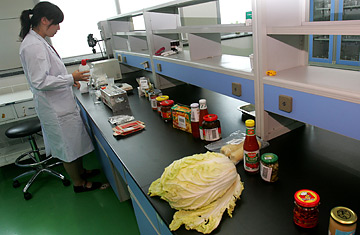
A Chinese inspector examines food products at the food safety inspection center of the Beijing entry-exit inspection and quarantine bureau, in Beijing.
The words "Made in China," sewn into countless pieces of clothing, has rubbed against the necks, wrists and waists of most Americans for years. But these days that label is rubbing members of Congress the wrong way.
Dozens of anti-China bills, denouncing China for alleged currency manipulation, illegal subsidizing of exports and violations of intellectual property law, have been circulating in the Senate for months. But since the recent health scares over toothpaste laced with antifreeze and tainted pet food from China, the anti-China sentiment on Capitol Hill has noticeably risen. So much so that Treasury Secretary Henry Paulson is about to head to China to raise "issues of concern to the U.S. Congress" with Chinese officials, including Chinese Premier Hu Jintao.
The threat of a trade war with China, by far the largest holder of U.S. debt, is serious. If China perceives itself a target, it might in turn levy a harsh tax on American imports, or outright forbid them. Such consequences, though, are not high on the minds of several Congressional committees looking for a way of easing the trade imbalance, which last year reached $233 billion.
Last Thursday, the Senate Finance Committee approved a bill, by a 20-1 vote, that would allow the Treasury to take action against China by lowering its standard for identifying currency distortion. Under existing law, the Treasury has had to prove that China intended to manipulate its currency. Under the bill, the Treasury would issue a report every six months on countries that maintain exchange rates that are "fundamentally misaligned" to the market value of their currencies, regardless of whether or not the government intended it for trade advantage. The bill also enables the Treasury to levy penalizing duties on imports from currency-manipulating countries. Since China stopped pegging its currency to the dollar in 2005, Senators say that the Yuan may have been undervalued by as much as 40%, making American exports to China more expensive and Chinese exports to America cheaper.
Iowa Sen. Charles Grassley, the ranking Republican on the Senate Finance Committee, praised the bill and said it would end President Bush's "pussyfooting" around China's unfair trade practices. Though the White House has filed several complaints against China with the World Trade Orbanization, Republican and Democratic Senators alike have criticized the Administration's actions against China's currency undervaluation as inadequate and unable to stymie the ongoing loss of American manufacturing jobs. The bill would require the Bush Administration to take action against currency manipulators through the WTO and the IMF.
The Treasury Department, however, came out against the bill in a statement, saying, "[We] do not believe the approaches taken in the bill reported today would strengthen the hand of the United States in achieving essential economic reform" in China. President Bush has also opposed the bill.
The Senate Banking Committee has its own China bill, which would also make it harder for the Treasury to avoid labeling China as a currency manipulator. While the two committees have wrangled over jurisdiction in the case, Senate Finance Committee Chairman Max Baucus has accepted amendments from Sen. Debbie Stabenow, the Michigan Democrat, who co-authored the Banking Committee's bill, and says he does not see the turf battle as "a big issue at all. We are both striving for the same goal."
The Senate Commerce Committee has not yet introduced a bill, but last week it held a hearing on U.S.-China trade, where labor leaders and corporate chiefs aired their grievances about China's unfair trade practices — from its unwillingness to enforce a minimum wage to its negligent enforcement of intellectual property law. James Hoffa, President of the International Brotherhood of Teamsters, fresh from his recent tour of Chinese cities, told the committee that China's "first priority is economic progress. It second priority is people." Scott Paul, executive director of the Alliance for American Manufacturing, blasted China for breaking the rules of the WTO, behavior he called tantamount to "cheating." "China must be held accountable," he said, for its "unfair and predatory practices... American companies can compete against foreign companies, but they can't compete against foreign governments."
That sentiment is pretty common in the halls of Congress these days, but there remains a bipartisan, if bite-sized, opposition. The only Senator to dissent during the Commerce Committee's hearing was Jim DeMint, the South Carolina Republican, who complained that American business would be more competitive if Senators stopped "attacking China" and instead reformed torts, America's "Byzantine tax system" and its excessive regulation of business. Washington Democrat Maria Cantwell, meanwhile, was the only Senator to vote against the Finance Committee's bill, arguing it would be "interpreted as protectionism" by the Chinese, and could prompt them to retaliate by selling some of their vast amount of American treasury bonds.
But the 20-1 vote, in the Finance Committee, with unanimous support from the Committee's Republicans, made it clear that protectionism is no longer a dirty word in the either major party — especially not ahead of a presidential election. The Democrats' presidential front-runners share Congress's increasing hostility to free trade, and China isn't their only target: former North Carolina Senator John Edwards and Illinois Senator Barack Obama have both called for the renegotiation of the North American Free Trade Agreement. And even New York Senator and former First Lady Hillary Clinton opposes a proposed free-trade deal with South Korea, though it was her husband who brought Americans NAFTA, the WTO and helped bestow China permanent most-favored-nation trade status.
